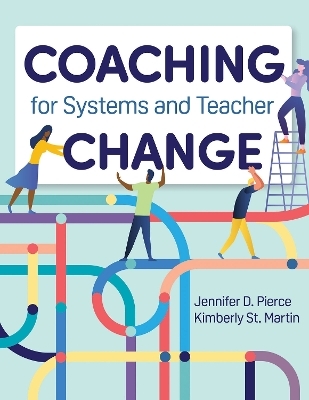
Coaching for Systems and Teacher Change
Brookes Publishing Co (Verlag)
978-1-68125-422-7 (ISBN)
Coaching between educators is one of the best ways to improve outcomes for all learners—but coaches rarely get formal preparation for mastering this important role. Give coaches the expert support they need with this essential new resource, a comprehensive guide to what effective coaching looks like across the PreK-12 grade span and how to conduct powerful coaching cycles with teachers and teams.
With a focus on improved practice for coaches and big-picture systems change, the authors combine relevant research with hands-on guidance and resources for planning, conducting, and reflecting on the quality of coaching when working with individual teachers or leadership teams. Readers will start with foundational information on coaching goals, activities, and challenges; a synthesis of research on coaching practices that work with teachers and teams; and guidance on applying systems-level change principles to the coaching process. Then they’ll get strategies and resources to help them implement the key features of an effective coaching framework (see below). Vivid examples show what successful coaching looks like at different grade levels, and 30 downloadable tools help coaches take confident action, reflect on their practices, and continuously improve.
A must-have professional reference for coaches, educator teams, and administrators, this book is the key to conducting powerful coaching sessions that lead to better outcomes for every student.
Implement an effective coaching framework through:
Alliance building: Take an intentional approach to developing an equitable, mutually beneficial partnership with a shared purpose.
Observing: Watch the teacher or team in action, gather simple data, and use the data to construct feedback and encourage reflection.
Modeling: Demonstrate to coachees how to use a specific teaching or teaming practice.
Providing performance feedback: Share your feedback so that coachees have concrete, actionable data that helps them reflect on their practices and advance their goals.
Includes 30 coaching tools:
Coaching Protocols
Reflecting on My Coaching Role
Coaching Compact
Readiness Assessment
Understanding System Challenges
Conducting Plan-Do-Study-Act Cycles
Alliance Assessment
Tips for Networking Teachers and Teams
Coaching Implementation Checklist
Calculating the Fiscal Costs of Coaching
Coaching Self-Assessment
and more!
Jennifer D. Pierce, Ph.D. Senior Technical Assistance Consultant at American Institutes for Research with 13 years of experience working in public and private school settings as a teacher, coach, and administrator. Jennifer also has four years of experience working in higher education as a researcher and instructor. At AIR, Jennifer works with the National Center for Systemic Improvement (NCSI) and the New York State Education Department (NYSED) RTI project to provide support to states, districts, and local-level educators in their efforts to effectively implement evidence-based practices (EBPs). Her primary areas of interest are in effective professional development and coaching models to reduce the research-to-practice gap; implementation science, including frameworks across fields and factors associated with sustained use of EBPs; and, the application of multi-tiered systems of support across general education and special education, including Response to Intervention (RTI) and schoolwide positive behavior interventions supports (SWPBIS). Dr. Pierce earned a Ph.D. in special education from the University of Washington, Seattle, a master's in general education from Pacific Lutheran University, and a bachelor's degree in English and Psychology from the University of Washington, Seattle. Virginia Buysse, Ph.D. Principal Researcher Virginia Buysse is a principal researcher at AIR. She developed a program of research on Recognition & Response (R&R), an instructional system for pre-k consisting of formative assessment, and foundational and targeted instruction with funding from the U.S. Department of Education (Institute of Education Sciences) and the Emily Hall Tremaine Foundation. She served as co-principal investigator on several national early childhood centers, including the National Professional Development Center on Inclusion, the Center to Mobilize Knowledge on Early Childhood, and the Center for Early Care and Education Research-Dual Language Learners. She also served on the National Research Council's Committee on Early Childhood Education and the Workforce. Dr. Buysse has served as an expert consultant on a number of federally funded projects, including those focused on progress monitoring and program evaluation in early childhood. She was past president of the Division for Early Childhood of the Council for Exceptional Children and was member of the technical experts panel that developed CEC's evidence-based standards for research in special education. She has authored four books and has published over 80 peer-reviewed journal articles on early childhood education and early intervention. With over 25 years of professional experience, she has expertise on a range of early childhood topics, including professional development and models of professional collaboration (coaching, consultation, communities of practice), program evaluation, multi-tiered instructional approaches in pre-k, and formative assessment for use in data-based decision-making.
About the Downloads
About the Authors
Introduction
Section I: Introduction and Core Concepts
Chapter 1: Making the Case for Coaching: From an Historical to a Contemporary View
Chapter 2: Coaching Goals, Activities, and Common Challenges
Chapter 3: Effective Coaching Practices: A Synthesis of Research
Chapter 4: Applying Systems Level Change Principles to the Coaching Process
Section II: Strategies and Resources for More Effective Coaching
Chapter 5: Building Alliance: Laying the Foundation for Effective Coaching
Chapter 6: Moving Beyond Alliance: Conducting Cycles of Observation, Modeling, and Providing Performance Feedback
Chapter 7: Facing the Complexities of Change: Resources and Tools to Enhance Forward Movement
Chapter 8: Let’s Make It Real: Applying Coaching to Critical Issues
Section III. Implementing an Effective Coaching Framework
Chapter 9: Coaching that Sticks: Resources and Tools
Appendices
Index
| Erscheinungsdatum | 31.08.2022 |
|---|---|
| Verlagsort | Baltimore |
| Sprache | englisch |
| Maße | 223 x 289 mm |
| Gewicht | 363 g |
| Themenwelt | Sozialwissenschaften ► Pädagogik ► Berufspädagogik |
| Sozialwissenschaften ► Pädagogik ► Erwachsenenbildung | |
| ISBN-10 | 1-68125-422-0 / 1681254220 |
| ISBN-13 | 978-1-68125-422-7 / 9781681254227 |
| Zustand | Neuware |
| Informationen gemäß Produktsicherheitsverordnung (GPSR) | |
| Haben Sie eine Frage zum Produkt? |
aus dem Bereich


